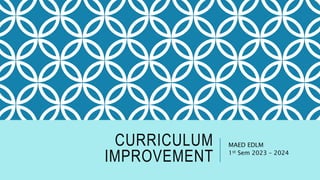
Curriculum-improvement - Education Course
- 1. CURRICULUM IMPROVEMENT MAED EDLM 1st Sem 2023 – 2024
- 2. Micro-Level Adjustments: •Lesson Planning: Teachers make small adjustments to individual lessons to address student needs, incorporate new resources, or enhance engagement. •Activity Modification: Educators tweak specific activities or assignments to better align with learning objectives or to cater to the diverse needs of students.
- 3. Grade/Subject-Level Revisions: •Unit Planning: Teachers collaborate to revise units within a grade or subject, ensuring coherence, alignment with standards, and effectiveness in meeting learning objectives. •Assessment Refinement: Teachers may collaboratively review and adjust assessments to better gauge student understanding and provide constructive feedback.
- 4. School-Level Curriculum Review: •Vertical Alignment: Ensures that the curriculum progresses logically from one grade to the next, addressing skill development and building on prior knowledge. •Horizontal Alignment: Ensures consistency in content and teaching approaches across different classrooms or subjects within the same grade.
- 5. 1.District-Level Overhauls: 1. Curriculum Mapping: Involves a comprehensive review and restructuring of the entire district curriculum, ensuring alignment with state and national standards. 2. Resource Allocation: Districts may allocate resources for professional development, instructional materials, and technology to support curriculum improvements.
- 6. State/Regional-Level Initiatives: •Standard Revisions: State education departments may revise academic standards to reflect changes in educational philosophy, technological advancements, or societal needs. •Assessment Frameworks: Changes in statewide assessments can influence curriculum improvements as educators align teaching practices with assessment expectations.
- 7. National-Level Reforms: •Policy Changes: National education policies and initiatives can drive significant curriculum changes, affecting standards, assessment methods, and overall educational goals. •Research-Based Practices: Integration of research findings into national curriculum frameworks to enhance effectiveness and relevance.
- 8. Global Educational Trends: •International Benchmarking: Countries may compare their education systems to global benchmarks, leading to adjustments in curricular content and teaching methodologies. •Global Competency Integration: Curricula may be adjusted to incorporate skills and knowledge that prepare students for success in a globalized world.
- 9. Technological Advancements: •Integration of Technology: Curriculum improvements may involve the incorporation of new technologies to enhance learning experiences, such as online resources, digital tools, and virtual simulations. •Digital Literacy: Changes in the curriculum to emphasize the development of digital literacy skills necessary for the modern workforce.
- 10. Inclusive Education Initiatives: •Diversity and Inclusion: Curriculum improvements may involve a focus on diverse perspectives, cultures, and experiences to create a more inclusive learning environment. •Special Education Integration: Enhancements to curriculum structures to better support students with diverse learning needs.
- 11. Continuous Professional Development: •Teacher Training Programs: Ongoing professional development for educators to stay current with best practices, instructional strategies, and subject matter expertise. •Pedagogical Innovation: Encouraging and supporting teachers in experimenting with innovative teaching methods and incorporating feedback into curriculum improvements.
- 12. The level of curriculum improvement can vary based on the scope, impact, and stakeholders involved. Successful educational systems often engage in continuous improvement at multiple levels to adapt to the evolving needs of students and society.
- 13. HOW CURRICULUM IMPROVEMENT CAN BE DONE?
- 14. Individual Teacher Level: •Lesson Planning: Teachers can make immediate and targeted adjustments to individual lessons based on student needs, assessment results, and ongoing reflection. •Incorporating Feedback: Teachers regularly gather and incorporate feedback from students, colleagues, and self-reflection into their instructional practices.
- 15. Department or Grade-Level Team: •Collaborative Planning: Teachers within the same subject area or grade level collaborate to ensure alignment, coherence, and consistency in curriculum delivery. •Assessment Review: Teachers collectively review and refine assessments to measure student understanding and inform instructional adjustments.
- 16. School Level: •Professional Learning Communities (PLCs): Regular PLC meetings allow educators to discuss and collaborate on curriculum design, instructional strategies, and assessment practices. •Vertical and Horizontal Alignment: Schools work to align curriculum vertically (across grade levels) and horizontally (across subjects) to ensure a cohesive and comprehensive learning experience.
- 17. District or Local Education Authority (LEA) Level: •Curriculum Committees: District-wide committees oversee curriculum development, review, and improvement. •Resource Allocation: Districts allocate resources for teacher professional development, instructional materials, and technology to support curriculum initiatives.
- 18. State Level: •Standards Revision: State education departments may revise academic standards to reflect changes in educational philosophy, societal needs, or global competitiveness. •Assessment Policies: Changes in state assessments can drive shifts in curriculum to align with new assessment expectations.
- 19. National Level: •National Curriculum Frameworks: Countries often establish national frameworks that guide the development and improvement of curricula across subjects and grade levels. •Policy Changes: National policies and initiatives can influence curriculum development and improvement.
- 20. International Benchmarking: •Global Standards: Countries may compare their educational systems to global benchmarks, leading to adjustments in curriculum content and expectations. •International Assessments: Participation in international assessments (e.g., PISA) can prompt national discussions on curriculum improvement to enhance global competitiveness.
- 21. Global Educational Trends: •21st Century Skills: Curricula may be adjusted to emphasize skills such as critical thinking, creativity, collaboration, and communication in response to global workforce demands. •Global Citizenship Education: Focus on incorporating global perspectives and promoting cultural awareness.
- 22. Technological Advancements: •Digital Integration: Curricula may evolve to incorporate new technologies and digital resources to enhance learning experiences. •Coding and Digital Literacy: Changes to address the growing importance of digital literacy skills in a technology-driven world.
- 23. Inclusive Education Initiatives: •Diversity and Inclusion: Efforts to create curricula that are inclusive and representative of diverse perspectives, cultures, and backgrounds. •Differentiated Instruction: Strategies to meet the needs of diverse learners through varied instructional approaches within the curriculum.
- 24. THANK YOU.